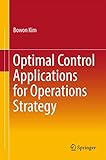Optimal control applications for operations strategy /
By: Kim, Bowon
Material type: BookPublisher: Singapore : Springer Nature, c2017.Description: xi, 223 p. : ill. ; 24 cm.ISBN: 9789811035982Subject(s): Management | Control theory | Industrial Management | Organizational BehaviorDDC classification: 658.4092 KI OP
BookPublisher: Singapore : Springer Nature, c2017.Description: xi, 223 p. : ill. ; 24 cm.ISBN: 9789811035982Subject(s): Management | Control theory | Industrial Management | Organizational BehaviorDDC classification: 658.4092 KI OP | Item type | Home library | Call number | Status | Date due | Barcode | Item holds |
|---|---|---|---|---|---|---|
| REGULAR | University of Wollongong in Dubai Main Collection | 658.4092 KI OP (Browse shelf) | Available | T0055994 |
, Shelving location: Main Collection Close shelf browser

|

|

|

|

|

|

|
||
| 658.4092 JO NE Nelson's way : leadership lessons from the great commander / | 658.4092 JO NE Nelson's way : leadership lessons from the great commander / | 658.4092 KE BA Bad leadership : what it is, how it happens, why it matters / | 658.4092 KI OP Optimal control applications for operations strategy / | 658.4092 KO FI The Five practices of exemplary leadership : legal services / Legal. | 658.4092 KO HO Hostage at the table : how leaders can overcome conflict, influence others, and raise performance / | 658.4092 KO JO John P. Kotter on what leaders really do |
Preface; Contents; 1 Optimal Control Theory and Operations Strategy; Abstract; 1 Basics of Optimal Control Theory; 1.1 Optimal Control Theory Model; 1.2 Maximum Principle; 2 Dynamics of Production Technology Development; 2.1 Introduction; 2.2 Production Technology Development; 2.3 Dynamic Optimal Control Model; 2.3.1 Dynamic Equations of Production Technology as Control Capability; 2.3.2 Dynamic Equation of System Dimension as System Capability; 2.3.3 System Utility Function; 2.3.4 Model Solution; 2.3.5 Value Interpretation of the Nonlearning Control Model Nonlimiting Process ({\hbox{T}} \lt \infty)Limiting Process (T \to \infty); 2.3.6 Constraint on {\varvec{R(T)}}; 2.3.7 Manufacturing Learning-Induced Model; 2.3.8 Dynamic Learning Model; 2.4 Inferences and Implications; Appendix 1: Derivation of Eqs. (27)-(29); Appendix 2: Basics of Differential Equations; Types of Optimization Models; Discrete-Time Models; Nondynamic Models; Dynamic Models; Continuous-Time Models; Nondynamic Models; Dynamic Models; Simple Differential Equations; Basic Principle; Integrating Factor; Appendix 3: Current Value Hamiltonian; Appendix 4: Bounded Controls 2 Value of Coordination in Supply Chain ManagementAbstract; 1 Joint Decision-Making in Supply Chain Management; 1.1 Decision-Making Structure; 1.2 Optimal Control Theory Models; 1.2.1 A Case in the Automotive Industry; 1.2.2 The Single Player-Dominating Decision-Making Structure: A Coercive Case; 1.2.3 The Balanced Decision-Making Structure: A Balanced Case; 1.3 Analysis of the Model; 1.3.1 Dynamics of the Single Player-Dominated Case: The Coercive Case; 1.3.2 Dynamics of the Balanced Decision-Making Case: The Balanced Case; 1.4 Numerical Examples; 1.5 Managerial Implications 2 Supply Chain Coordination2.1 Model Formulation; 2.1.1 A Simple Model: The Case of Constant Market Demand; 2.1.2 An Extended Model: The Case of Price-Dependent Market Demand; 2.2 Numerical Examples; 2.3 Conclusion and Managerial Implications; Appendix 1; A Single Player-Dominated (Coercive) Case; A Balanced Decision-Making Case; Appendix 2; Proof of Theorem 1; Proof of Theorem 2; Proof of Theorem 4; Proof of Theorem 5; Appendix 3: Discontinuous Control Variable; 3 Innovation Competition and Strategy; Abstract; 1 Basics of Dynamic Programming; 2 Basics of Differential Games 2.1 Open-Loop Solution2.2 Feedback Solution; 3 Innovation Competition; 3.1 A Continuous Dynamic Model; 3.1.1 Model Formulation; 3.1.2 Analysis Results; 3.1.3 Dynamic Causal Relation Analysis; 3.2 Numerical Examples; 3.3 Managerial Implications and Discussion; 4 Firms' Cooperation and Competition for Innovation; 4.1 Competition Versus Collaboration; 4.2 A Differential Game Model; 4.2.1 A Markov Perfect Nash Equilibrium Case; 4.2.2 A Perfect Coordination (Collusive) Case; 4.3 Analysis of the Model; 4.4 Numerical Examples and Inferences; 4.5 Managerial Implications.
This book focuses on the applications of optimal control theory to operations strategy and supply chain management. It emphasizes the importance of optimal control theory as a tool to analyze and understand fundamental issues in the respective fields. Delving deeper, the book also elaborates on how optimal control theory provides managerial and economic insights, enabling readers to comprehend the dynamic activities and interactions in operations. Given that optimal control theory is not a dominant approach to studying operations management in the current literature, this book fills that gap by showing its effectiveness as a tool to supplement other methodologies in operations.
